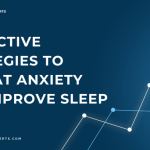Table of Contents
- Introduction: Understanding Anxiety
- Case Study 1: Sarah’s Journey Through Cognitive Behavioral Therapy
- Case Study 2: Mark’s Mindfulness Meditation Practice
- Case Study 3: Emily’s Lifestyle Changes
- Case Study 4: David’s Medication Management
- Common Questions about Anxiety Management
- Conclusion: Your Path to Managing Anxiety
Introduction: Understanding Anxiety
Anxiety is a common mental health condition affecting millions worldwide. It can manifest in various forms, such as generalized anxiety disorder (GAD), panic disorder, or social anxiety. While experiencing anxiety occasionally is normal, chronic anxiety can disrupt daily life and well-being.
Anxiety can feel overwhelming, but understanding it is the first step toward managing it effectively.
In this blog post, we’ll explore real-life success stories of individuals who have effectively managed their anxiety. By sharing these case studies, we aim to inspire and provide practical strategies for anyone looking to navigate their own journey through anxiety management.
Case Study 1: Sarah’s Journey Through Cognitive Behavioral Therapy
Sarah, a 28-year-old marketing professional, struggled with severe anxiety for years, particularly in social situations. After researching treatment options, she decided to try Cognitive Behavioral Therapy (CBT), a structured form of psychotherapy focusing on changing negative thought patterns.
The Approach
Sarah worked with a licensed therapist for 12 weeks, identifying her anxious thoughts and replacing them with more rational, positive beliefs. For instance, she learned to challenge her belief that “everyone is judging me” when feeling anxious at social events.
“CBT changed my life. I’m more confident and no longer feel paralyzed by fear.” — Sarah
The Outcome
By the end of her therapy, Sarah reported a significant decrease in anxiety levels and an increased ability to enjoy social gatherings. For more insights into CBT techniques, refer to our article on 10 effective CBT techniques to overcome anxiety.
Case Study 2: Mark’s Mindfulness Meditation Practice
Mark, a 35-year-old software engineer, found himself battling anxiety after a demanding work project. After hearing about the benefits of mindfulness meditation, he incorporated it into his daily routine.
The Approach
Mark started with just five minutes of meditation each morning, gradually increasing to 20 minutes. He also attended a local meditation class where he learned techniques for grounding and focusing his mind.
“Mindfulness has taught me to live in the moment instead of worrying about the future.” — Mark
The Outcome
Within a few months, Mark reported feeling calmer and more centered. His ability to manage stress improved, and he found it easier to concentrate on work. Discover more about mindfulness techniques in our piece on 10 effective mindfulness techniques to reduce anxiety.
Case Study 3: Emily’s Lifestyle Changes
Emily, a 22-year-old college student, faced anxiety related to academic pressure. After feeling overwhelmed, she made significant lifestyle changes to support her mental health.
The Approach
Emily focused on three core areas:
- Nutrition: She adopted a balanced diet rich in fruits, vegetables, and omega-3 fatty acids.
- Exercise: Emily started jogging three times a week, helping reduce her stress levels.
- Sleep Hygiene: She established a consistent sleep schedule, ensuring she got at least 7-8 hours of sleep each night.
“Taking care of my body changed everything. I feel like I can take on the world!” — Emily
The Outcome
As a result of these changes, Emily noticed a remarkable decline in her anxiety symptoms. She felt more energetic, focused, and ready to tackle her studies. For further exploration of lifestyle changes, check out our article on 7 effective exercises to reduce anxiety naturally.
Case Study 4: David’s Medication Management
David, a 45-year-old father of two, had battled anxiety for most of his adult life. After trying various therapies without success, he consulted a psychiatrist who recommended medication as part of his treatment plan.
The Approach
David was prescribed a selective serotonin reuptake inhibitor (SSRI) and began attending regular therapy sessions to complement the medication. This combination allowed him to manage his symptoms effectively.
“Medication gave me the stability I needed to work on myself in therapy.” — David
The Outcome
After several months, David experienced a significant reduction in anxiety symptoms. He was able to engage more fully in family life and even return to hobbies he had neglected. For insights on medications, refer to our resource on anxiety medications: what you need to know.
Common Questions about Anxiety Management
1. What are the signs of anxiety?
Signs can include excessive worry, restlessness, fatigue, difficulty concentrating, and physical symptoms like increased heart rate.
2. How long does it take to see results from therapy?
Results can vary based on the individual and the type of therapy, but many people begin to notice improvements within a few weeks.
3. Can lifestyle changes really impact anxiety?
Absolutely! Diet, exercise, and sleep play crucial roles in mental health and can significantly impact anxiety levels.
4. Is medication necessary for everyone with anxiety?
Not necessarily. While some individuals find medication helpful, many manage anxiety effectively through therapy and lifestyle changes.
Conclusion: Your Path to Managing Anxiety
Anxiety can be challenging, but as these real-life success stories show, it is possible to manage it effectively. Whether through therapy, mindfulness, lifestyle changes, or medication, finding the right strategy for you is essential. Remember, seeking help is a sign of strength, and you deserve support on your journey to better mental health.
If you or a loved one is struggling with anxiety, don’t hesitate to reach out for help. Explore resources, connect with professionals, and take the first step towards a calmer, more fulfilling life.
Feel free to share your own experiences or questions in the comments below. Let’s support each other on this journey!





